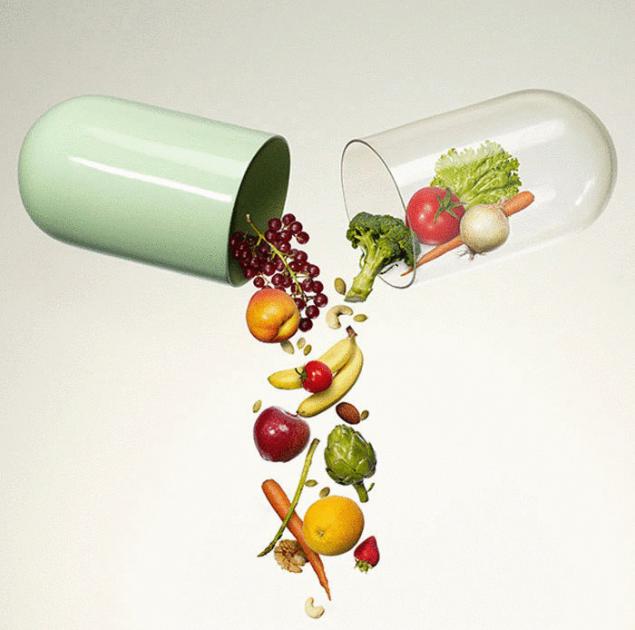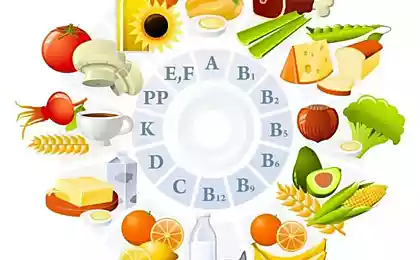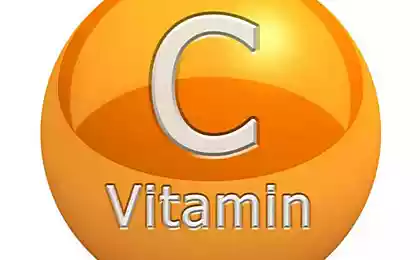512
Vitamin B1 —vitamin optimism
Vitamin B (Thiamine) is a water soluble vitamin that does not accumulate in the body and is not toxic. The history of the discovery of the vitamin is generally interesting and important in General for the history of vitamins. After all, assignment to vitamin B1 "thiamine", led to the emergence of the word vitamin. "Vita" means "life" and "amine" — "nitrogen-containing compound". Let's deal how it happened.
Its history is closely connected with this disease as Beri-Beri, which is distributed mainly in the East. If you translate the name, it means "can't do", this disease is accompanied by severe muscle depletion, which lead to heart failure and mental disorder. Beriberi in children is characterized by abdominal distension, convulsion, vomiting and lack of appetite.

For the first time in VII century there was the classical description of this disease, its author was Chao-Yang-Fang Wu-Chin. Dutch doctors, who were Eichmann and greens, in 1897, was able to demonstrate that the symptom of beriberi can cause the chickens if they get fed on polished rice, as it does not contain vitamin B1.
Scientist Casimir Funk in 1912 from the extract of rice bran have identified a factor that prevents the disease Beri-Beri, and called him "Amin." And thanks to Robert Williams appeared chemical formula of vitamin and it is called "thiamine". Just a year later, in 1937, went to the first commercial production of vitamin B1 (thiamine).
It is also called vitamin of optimism. It helps to ensure that the body normally grow and develop to worked proper cardiovascular and digestive systems, involved in the metabolism of carbohydrates and fats.
Action diaminobutane vitamin B1 in the course of the metabolism of nerve cells get the daily requirement of glucose. But if thiamine is not enough, the nerve cells begin to grow, "pull in" your nerve endings themselves trying to get glucose from the blood. Deformed and enlarged cells require a greater amount of glucose.
The layer of nerve cells in the spread is thinner and less protective, because of this "naked nerves" begin to break. That's why the nervous system due to thiamine continues to operate normally and is not subject to negative changes.
Thiamine, in addition, that helps nerve cells still does not allow aging cells of the brain, keeps memory and attention to the person throughout life and supports mental activity of man. With a lack of thiamine may receive Alzheimer's.
Interaction of vitamin B1 with other setstatuscodeservlet of thiamine and vitamin B12 lowers cholesterol, does not accumulate excess fat and neutralize toxins.
Choline is an antagonist. Sulfonamides and alcohol-containing medicines prevent the proper absorption of thiamine.
Not recommended simultaneous with intramuscular streptomycin, cyanocobalamin, penicillin, pyridoxine, and nicotinic acid. The level of thiamine in the body is significantly reduce the following drugs: alcohol-containing medicines, antibiotics, oral contraceptives, antacids.
For conversion to the active form of magnesium is needed.
What foods contain vitamin B1:so contains thiamine, oatmeal, peas, buckwheat, walnuts and other nuts, bread flour, fat pork, beef, fish, poultry, liver, eggs, legumes, rice bran and wheat germ, certain fruits and berries.
Daily dose of vitamin В1Для the adult daily dose is 1,2 — 2,6 mg per day.
Increases dramatically (almost 10 times) the need to take this vitamin with physical or severe mental stress, stress.
Indications for primenyayutsya or B1 avitaminosis; diseases of the nervous system (neuritis, polyneuritis, peripheral paralysis, etc.); Itching of the skin, dermatitis, psoriasis, pyoderma, eczema, diseases of the cardiovascular system; the Use of diuretics (if heart failure, hypertension); Depression; Endocrine disorders (diabetes, obesity, hyperthyroidism); an Organic dysfunction of the body; Diseases of the digestive organs; Contact with carbon disulfide and tetraethyl lead. Hypovitaminosis (lack of consequences)of the Violation of the brain; Irritability and depression; nerve damage; Paralysis; Disturbance of the digestive tract; Insomnia; memory impairment; decreased appetite; Fatigue; Diarrhea or constipation; weight loss; Pain and numbness of the limbs. Rickets is most common in people who use alcohol, cigarettes, refined sugar, instant coffee.
To excess thiamine is impossible, as is a water soluble vitamin and excreted from the body. Overdose can only be the case if you inject synthetic thiamine, a dose of 100 mg. Can appear the following side effects: allergic reaction, cramps, fever, low blood pressure. At long application — violation of the liver and kidneys.
Source: lubim-zhizn.ru
Its history is closely connected with this disease as Beri-Beri, which is distributed mainly in the East. If you translate the name, it means "can't do", this disease is accompanied by severe muscle depletion, which lead to heart failure and mental disorder. Beriberi in children is characterized by abdominal distension, convulsion, vomiting and lack of appetite.

For the first time in VII century there was the classical description of this disease, its author was Chao-Yang-Fang Wu-Chin. Dutch doctors, who were Eichmann and greens, in 1897, was able to demonstrate that the symptom of beriberi can cause the chickens if they get fed on polished rice, as it does not contain vitamin B1.
Scientist Casimir Funk in 1912 from the extract of rice bran have identified a factor that prevents the disease Beri-Beri, and called him "Amin." And thanks to Robert Williams appeared chemical formula of vitamin and it is called "thiamine". Just a year later, in 1937, went to the first commercial production of vitamin B1 (thiamine).
It is also called vitamin of optimism. It helps to ensure that the body normally grow and develop to worked proper cardiovascular and digestive systems, involved in the metabolism of carbohydrates and fats.
Action diaminobutane vitamin B1 in the course of the metabolism of nerve cells get the daily requirement of glucose. But if thiamine is not enough, the nerve cells begin to grow, "pull in" your nerve endings themselves trying to get glucose from the blood. Deformed and enlarged cells require a greater amount of glucose.
The layer of nerve cells in the spread is thinner and less protective, because of this "naked nerves" begin to break. That's why the nervous system due to thiamine continues to operate normally and is not subject to negative changes.
Thiamine, in addition, that helps nerve cells still does not allow aging cells of the brain, keeps memory and attention to the person throughout life and supports mental activity of man. With a lack of thiamine may receive Alzheimer's.
Interaction of vitamin B1 with other setstatuscodeservlet of thiamine and vitamin B12 lowers cholesterol, does not accumulate excess fat and neutralize toxins.
Choline is an antagonist. Sulfonamides and alcohol-containing medicines prevent the proper absorption of thiamine.
Not recommended simultaneous with intramuscular streptomycin, cyanocobalamin, penicillin, pyridoxine, and nicotinic acid. The level of thiamine in the body is significantly reduce the following drugs: alcohol-containing medicines, antibiotics, oral contraceptives, antacids.
For conversion to the active form of magnesium is needed.
What foods contain vitamin B1:so contains thiamine, oatmeal, peas, buckwheat, walnuts and other nuts, bread flour, fat pork, beef, fish, poultry, liver, eggs, legumes, rice bran and wheat germ, certain fruits and berries.
Daily dose of vitamin В1Для the adult daily dose is 1,2 — 2,6 mg per day.
Increases dramatically (almost 10 times) the need to take this vitamin with physical or severe mental stress, stress.
Indications for primenyayutsya or B1 avitaminosis; diseases of the nervous system (neuritis, polyneuritis, peripheral paralysis, etc.); Itching of the skin, dermatitis, psoriasis, pyoderma, eczema, diseases of the cardiovascular system; the Use of diuretics (if heart failure, hypertension); Depression; Endocrine disorders (diabetes, obesity, hyperthyroidism); an Organic dysfunction of the body; Diseases of the digestive organs; Contact with carbon disulfide and tetraethyl lead. Hypovitaminosis (lack of consequences)of the Violation of the brain; Irritability and depression; nerve damage; Paralysis; Disturbance of the digestive tract; Insomnia; memory impairment; decreased appetite; Fatigue; Diarrhea or constipation; weight loss; Pain and numbness of the limbs. Rickets is most common in people who use alcohol, cigarettes, refined sugar, instant coffee.
To excess thiamine is impossible, as is a water soluble vitamin and excreted from the body. Overdose can only be the case if you inject synthetic thiamine, a dose of 100 mg. Can appear the following side effects: allergic reaction, cramps, fever, low blood pressure. At long application — violation of the liver and kidneys.
Source: lubim-zhizn.ru
Success in society or how to become an interesting person
Waterfall Dragon in Venezuela, South America























